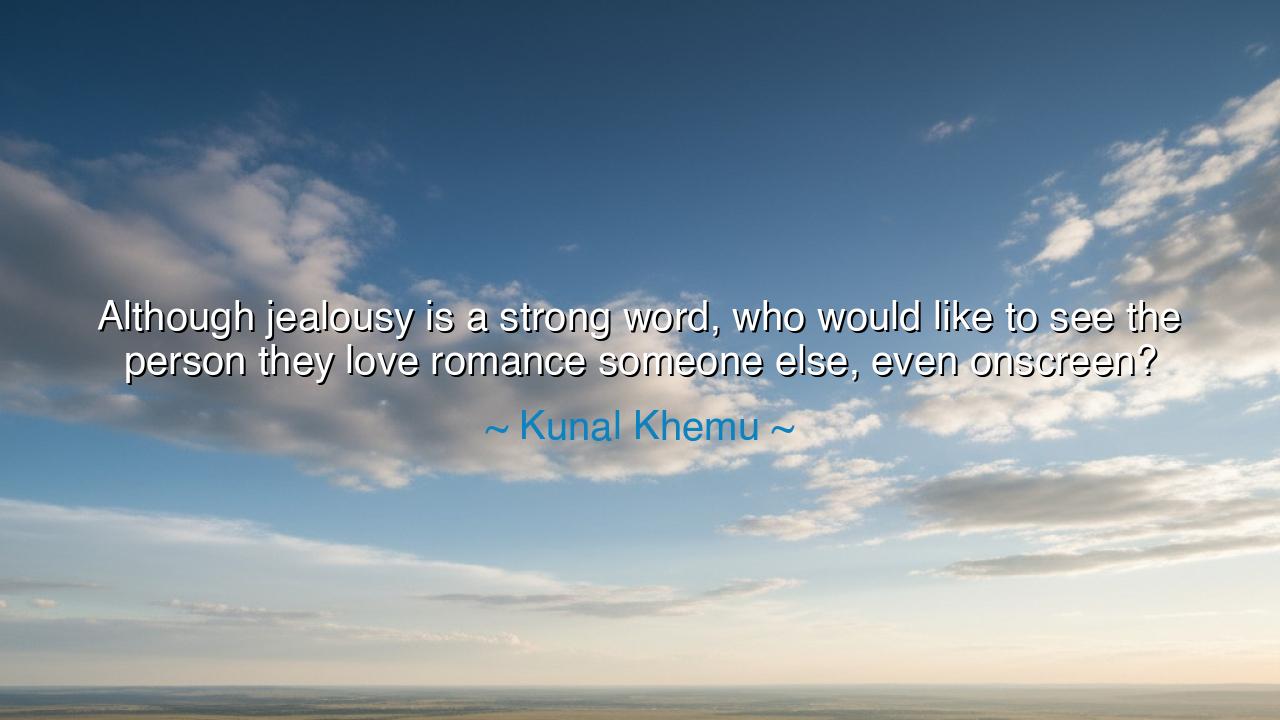
Although jealousy is a strong word, who would like to see the
Although jealousy is a strong word, who would like to see the person they love romance someone else, even onscreen?






"Although jealousy is a strong word, who would like to see the person they love romance someone else, even onscreen?" In this honest and vulnerable confession, Kunal Khemu, an actor of the modern age, reveals a truth as ancient as love itself. Beneath the surface of his words lies not merely a question of cinema or performance, but of the human heart—its frailty, its possessiveness, its yearning for exclusivity. His statement is not about fame or jealousy in the world of actors; it is about the eternal tension between love and insecurity, between admiration and the quiet fear of losing what we hold most dear. Even as he softens the emotion with humility—saying that jealousy is “a strong word”—he admits what every lover, from the dawn of time, has felt: that to truly love is to expose oneself to the possibility of pain, for love always opens the door to jealousy.
To understand the depth of this quote, one must first see the nature of jealousy not as an evil, but as an ancient and instinctive force. In the earliest myths, jealousy is portrayed as both destructive and divine. Hera, the queen of the gods, burned with jealousy for Zeus’s infidelities; Othello, in Shakespeare’s tragedy, was consumed by suspicion until he destroyed the very love he cherished. Yet within this storm of emotion lies a deeper truth: jealousy is not born from hatred, but from love’s longing to be irreplaceable. It arises not because we wish harm, but because we fear loss—because something precious to us has become so entwined with our being that even the thought of it belonging to another feels like the tearing of the soul.
Kunal Khemu’s reflection emerges from the world of acting, where illusion often meets reality. In his profession, to see the one you love enact scenes of romance with another—even in the name of art—demands a rare strength of spirit. It challenges the boundary between fiction and feeling. His words echo the eternal struggle of those who must love within a world of appearances, a world where trust must be stronger than instinct. This is not only true for actors; it is true for all who love. For love asks us to believe—to trust that affection can coexist with distance, that loyalty can survive the test of circumstance. Yet as Khemu admits, even the strongest hearts feel the sting of envy, for love is not logic—it is emotion, raw and sacred.
History, too, offers examples of such conflict between love, jealousy, and understanding. Consider the story of Abelard and Heloise, the philosopher and his student, whose love was both intellectual and passionate. When Abelard’s fame and teachings drew admiration from others, Heloise struggled with jealousy—not because she doubted his mind, but because she feared his affection might drift. Yet in their letters, which have endured for centuries, they both came to understand that true love is not about ownership, but acceptance—that the soul, when purified by patience and trust, transcends jealousy. Their tragedy became a lesson for generations: that love, if it is to endure, must learn to stand beside jealousy without being ruled by it.
And so, Khemu’s statement, though spoken softly, touches upon a heroic struggle of the heart—the same one faced by kings and poets, lovers and dreamers. To feel jealousy is human; to master it is divine. The heart that loves will always tremble when it sees what it fears to lose, yet love matures when it learns to let the beloved be free. This is the journey from possession to devotion, from insecurity to faith. The ancients would say: “Love is a fire that purifies, but jealousy is the smoke that clouds the flame.” It is only by learning to rise above the smoke that love reveals its true light.
Yet let us not condemn jealousy entirely, for even in its pain there is wisdom. It reminds us of what we value, of what we cannot afford to take for granted. A love that never feels the fear of loss may not fully understand its worth. The key, then, is not to destroy jealousy, but to transform it—to let it teach humility, not bitterness; reflection, not suspicion. When we acknowledge it, when we name it as Khemu does, we disarm it. We turn it from a silent poison into a visible truth, and through honesty, we purify it. For only those who dare to confront their jealousy with grace can ever claim to know the depth of love’s courage.
Let this then be the lesson drawn from Kunal Khemu’s words: love not blindly, but bravely. When jealousy arises, see it not as a curse, but as a test—a call to strengthen trust, to honor your beloved not as possession but as a soul walking beside your own. To love is to let the other shine, even when that light does not fall upon you. True love, like the sun, loses nothing by letting the moon reflect its glow. So when the heart trembles with envy, answer it not with anger, but with understanding. For the one who learns to love beyond jealousy becomes not weaker, but greater—rising above the limits of emotion into the realm of grace, faith, and enduring devotion.






AAdministratorAdministrator
Welcome, honored guests. Please leave a comment, we will respond soon